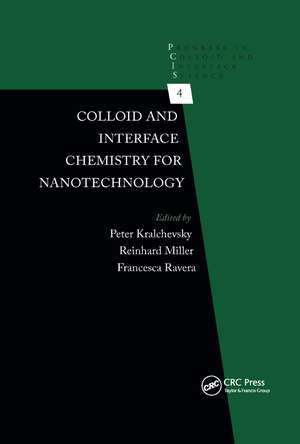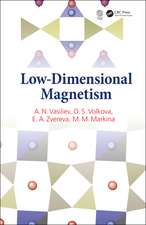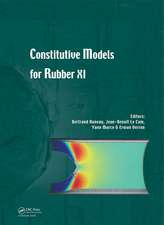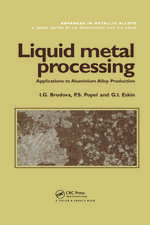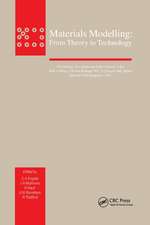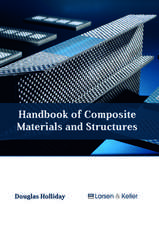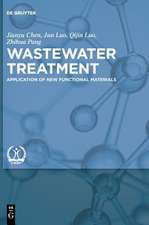Colloid and Interface Chemistry for Nanotechnology: Progress in Colloid and Interface Science
Editat de Peter Kralchevsky, Reinhard Miller, Francesca Raveraen Limba Engleză Paperback – 23 oct 2019
With contributions by leading experts, this book covers a wide range of topics. Chapters are grouped into three sections: "Nanoparticle Synthesis and Characterization," "New Experimental Tools and Interpretation," and "Nanocolloidal Dispersions and Interfaces." The topics covered belong to six basic research areas: (1) The synthesis of nanostructured materials of well-defined size and function; (2) Analytical methods and tools for control and characterization of synthesized nanomaterials; (3) Self-assembly of nanomaterials, such as microemulsions and micelles, and their applications; (4) Bioinspired nanostructured materials—structure, properties, and applications; (5) Design of active, soft functional interfaces with unique properties for sensors, catalysts, and biomedical assays; and (6) Nanoscale elements in soft nanoscale devices for applications in analytical and biomedical sciences.
This book describes highlights in nanotechnology based on state-of-the-art principles in colloid and interface science, demonstrating how great progress in the various branches of nanotechnology can be achieved. The application of these principles allows for the development of new experimental and theoretical tools.
| Toate formatele și edițiile | Preț | Express |
|---|---|---|
| Paperback (1) | 510.54 lei 6-8 săpt. | |
| CRC Press – 23 oct 2019 | 510.54 lei 6-8 săpt. | |
| Hardback (1) | 1344.36 lei 6-8 săpt. | |
| CRC Press – 23 iul 2013 | 1344.36 lei 6-8 săpt. |
Preț: 510.54 lei
Preț vechi: 600.63 lei
-15% Nou
Puncte Express: 766
Preț estimativ în valută:
97.69€ • 102.27$ • 80.83£
97.69€ • 102.27$ • 80.83£
Carte tipărită la comandă
Livrare economică 05-19 aprilie
Preluare comenzi: 021 569.72.76
Specificații
ISBN-13: 9780367379759
ISBN-10: 0367379759
Pagini: 564
Dimensiuni: 156 x 234 mm
Greutate: 1.04 kg
Ediția:1
Editura: CRC Press
Colecția CRC Press
Seria Progress in Colloid and Interface Science
ISBN-10: 0367379759
Pagini: 564
Dimensiuni: 156 x 234 mm
Greutate: 1.04 kg
Ediția:1
Editura: CRC Press
Colecția CRC Press
Seria Progress in Colloid and Interface Science
Public țintă
Professional Practice & DevelopmentCuprins
Section I Nanoparticle Synthesis and Characterization. Advanced Strategies for Drug Delivery in Nanomedicine. Environmental Impact of Nanomaterials. Magnetic Field Directed Self-Assembly of Magnetic. Nanoparticles into Higher-Order Structures. Particle–Surfactant Interaction at Liquid Interfaces. Magnetic-Core Microgels. The Central Role of Interparticle Forces in Colloidal Processing of Ceramics. Synthesis of Anisotropic Gold Nanocrystals Mediated by Water-Soluble Conjugated Polymers and Lead and Cadmium Salts. Assembly of Non-Aqueous Colloidal Dispersions under External Electric Field. Oil-in-Water Microemulsions for the Synthesis of Nanocrystalline, Mesoporous, and Ultrafine CeO2 Powders. Low-Density Solid Foams Prepared by Simple Methods Using Highly Concentrated Emulsions as Templates. Section II New Experimental Tools and Interpretations. Simulation of Interfacial Properties and Droplet Hydrodynamics. The Contact Angle as an Analytical Tool. Capillary Pressure Experiments with Single Drops and Bubbles. AC Electrokinetics in Concentrated Suspension. Interfacial Rheology of Viscoelastic Surfactant–Polymer Layers. Hofmeister Effect in Ion-Selective Electrodes from the Fluid–Fluid Interface Perspective. Section III Interfaces and Nanocolloidal Dispersions. Human Serum Albumin Adsorption on Solid Substrates: Electrokinetic Studies. Co-Adsorption of the Proteins β-Casein and BSA in Relation to the Stability of Thin Liquid Films and Foams. New Trends in Phospholipid Research. Thermodynamics and Specific Ion Effects in Connection with Micellization of Ionic Surfactants. Stiff and Flexible Water-Poor Microemulsions: Disconnected and Bicontinuous Microstructures, Their Phase Diagrams, and Scattering Properties. Index.
Notă biografică
Peter Kralchevsky received a Ph.D. in physical chemistry in 1985 from the Sofia University, Bulgaria. Since 2002, he has been a full professor in the Department of Chemical Engineering of the Sofia University. He is co-author of more than 170 publications. Professor Kralchevsky’s scientific interests are in the area of thin liquid films and surface forces, capillary forces and phenomena, thermodynamics and kinetics of surfactant adsorption, micellization, and solubilization. He was chair of EU COST Action "Colloid and Interface Chemistry for Nanotechnology" (2008-2011) and is presently secretary of the European Colloid and Interface Society (ECIS).
Reinhard Miller studied mathematics in Rostock and colloid science in Dresden. He received a Ph.D. in physical chemistry in 1978 in Berlin. Since 1992, he has been a senior scientist at the MPI of colloids and interfaces in Potsdam, Germany. Dr. Miller is co-author of more than 450 publications. His scientific interests are dynamics of interfacial layers, interfacial rheology, and foams and emulsions. He is currently president of the ECIS.
Francesca Ravera studied physics at the University of Genoa (Italy) and physical chemistry of surfaces at the University of Aix-Marseille (1991-1992). Since 2002, she has been a senior researcher at CNR – Institute for Energetics and Interfaces in Genoa. Dr. Ravera is co-author of more than 100 publications. Her principal scientific interests are adsorption of surfactants and transport processes in liquids, dynamic interfacial phenomena, interfacial rheology, and foams and emulsions.
Reinhard Miller studied mathematics in Rostock and colloid science in Dresden. He received a Ph.D. in physical chemistry in 1978 in Berlin. Since 1992, he has been a senior scientist at the MPI of colloids and interfaces in Potsdam, Germany. Dr. Miller is co-author of more than 450 publications. His scientific interests are dynamics of interfacial layers, interfacial rheology, and foams and emulsions. He is currently president of the ECIS.
Francesca Ravera studied physics at the University of Genoa (Italy) and physical chemistry of surfaces at the University of Aix-Marseille (1991-1992). Since 2002, she has been a senior researcher at CNR – Institute for Energetics and Interfaces in Genoa. Dr. Ravera is co-author of more than 100 publications. Her principal scientific interests are adsorption of surfactants and transport processes in liquids, dynamic interfacial phenomena, interfacial rheology, and foams and emulsions.
Descriere
With contributions by leading experts, this book covers a wide range of topics. It describes highlights in nanotechnology based on state-of-the-art principles in colloid and interface science, demonstrating how great progress in the various branches of nanotechnology can be achieved. The application of these principles allows for the development of new experimental and theoretical tools. The chapters give examples of the synthesis of nanoparticles for specific applications as well as their characterization in bulk phases and at interfaces.
